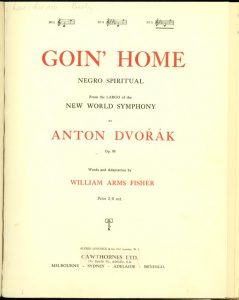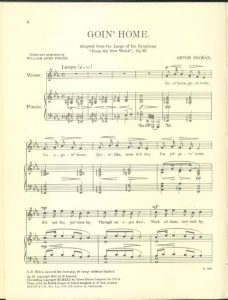This week while browsing the Sheet Music Consortium my eye was caught by a particular title: “Goin’ home: Negro spiritual from the largo of the New World Symphony, op. 95.” I was curious as to what this material could be – was the New World Symphony based on a spiritual?
I was surprised to learn that this title was in fact invoking a song written to the music of the largo from Dvorak’s famous American symphony. The lyrics to “Goin’ home” were written and set to music by William Arms Fisher in 1922, after the premier of the “New World Symphony” in 1893. Fisher was a student of Dvorak’s at the National Conservatory, and later went on to become a music editor, historian, and songwriter. He wrote on the impact and importance of 18th and early 19th century American music, and also compiled anthologies of Irish songs and Negro spirituals. Fisher is however most well known for the setting of “Goin’ home” at hand.
In his forward to “Goin’ home,” Fisher writes about his inspiration for writing lyrics to go with the second movement of the New World Symphony:
“That the lyric opening theme of the Largo should spontaneously suggest the words “Goin’ home, Goin’ home” is natural enough, and that the lines that follow the melody should take the form of a negro spiritual accords with the genesis of the symphony.”
In this statement by Fisher, as in the symphony as a whole, we see a blending of genres, a crossing of Dvorak’s European symphonic traditions with pastoral and folk-y American inspiration. Fisher believed that the homesick, almost tragic qualities of the English horn melody in the largo movement embodied Negro spirituals, which thus called him to interweave the spiritual with the symphony. However, is “Goin’ home” a Negro spiritual if Fisher wrote the lyrics and Dvorak wrote the music?
This brings up the question of authorship for me, and the author’s/composer’s intentions while writing the music. First of all, Fisher chose to write the lyrics in a dialect, which was a conscious decision on his part. It seems to me like an effort to be more authentic and true to the style in which he was writing, a style rooted in a tradition and experience he did not share. Fisher’s outsider and dangerously essentialized perspective of black people is shown here in the introduction to his anthology entitled “Negro spirituals.” He writes that black people were:
“Given an ingenuous native capacity for rhythmic musical expression, the gift of improvisation, a primitive but intense emotionalism, a condition of life that ranged from the most naïve light-heartedness to tragic somberness, and an utter dependence for consolation upon faith in invisible realities, often tinged with lingering elements from a barbaric past, and you have that truly unique product – the Spiritual with its background of torch-lit groves, swaying bodies and half-closed eyes.”
In this quote Fisher throws one stereotype after another at his reader, while attempting to recognizing the greatness of the genre. So since the spiritual is, as Fisher asserts, “a truly unique product” then why did Fisher not have any qualms about writing music for this genre? Lastly, as I watch videos and listen to recordings of “Goin’ home” being performed, I am reminded of the commercial purposes that this setting of text to already established music serves. The vocal version of this piece increases its accessibility, and provides many more opportunities for performance and commercial consumption. Fisher builds on the success of Dvorak, in a time where it would’ve been prudent to expand the boundaries of this symphonic work.
Sources
- Beckerman, Michael. “The Real Value of Yellow Journalism: James Creelman and Antonín Dvorák.” Musical Quarterly 77, no. 4 (1993): 749. http://www.jstor.org/stable/pdf/742357.pdf?refreqid=excelsior%3A44e9b3926e7a50b8f624e4eafb225c8b
- Dvorak, Antonin and New W. Symphony. 95 Adelaide: Cawthornes Ltd, 1922. (retrieved October 23, 2017). http://nla.gov.au/nla.obj-166692271/view?partId=nla.obj-166692390#page/n1/mode/1up
- Karl Kroeger. “Fisher, William Arms.” Grove Music Online. Oxford Music Online. Oxford University Press, accessed October 24, 2017, http://www.oxfordmusiconline.com/subscriber/article/grove/music/0974
- “The Looking Glass.” The Crisis, February 1927, 210-11.
- “[Front Matter].” In Seventy Negro Spirituals, edited by William Arms Fisher, 1-42. Oropesa, Castilla-La Mancha: Oliver Ditson &, 1926. http://search.alexanderstreet.com/view/work/bibliographic_entity%7Cdocument%7C3399955



